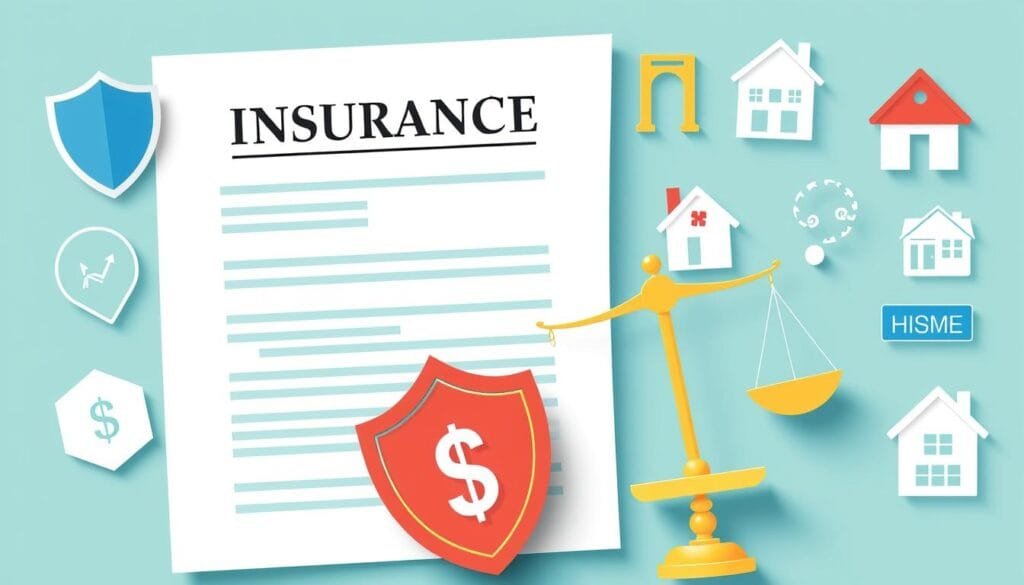ביטוח בית הוא חיוני לשמירה על יציבות הכספים שלך. הוא מגן נגד סיכונים שעשויים לפגוע ברכושך ובחפצים שלך. לדעת את היסודות של ביטוח בית היא מפתח לשמירה היטב על הנכסים שלך. עם עליית ערכי הנכסים, חשוב יותר מתמיד לקבל ביטוח טוב. ביטוח זה משמיע אותך על ידי כיסוי ההפסדים מגניבה, שריפה וזעם הטבע. זה מאפשר לבעלי בתים להתמקד בדברים חשובים.
למידה על ביטוח בית עוזרת לאנשים לקבל החלטות חכמות. ההחלטות הללו משפרות את ההגנה על נכסיהם ועל הכסף שלהם.
מסקנות מרכזיות
- ביטוח בית הוא חיוני לשמירה על נכסיך ועל רכושך.
- מדיניות רחבה מכסה נזקים מסיכונים כגון גניבה ואסונות טבע.
- הבנת יסודות ביטוח בית עוזרת בקבלת החלטות מושכלות.
- ספקי ביטוח מציעים רמות שונות של כיסוי ותמיכה.
- סקירה תדירה של מדיניותך מבטיחה הגנה מתאימה עם עליית ערכי הנכסים.
הבנת מושגי ביטוח הבית
הבנת הגדרת ביטוח הבית חיונית לכל בעל בית. ביטוח זה פועל כמכוסה ביטחון. הוא מגן עליך מאובדן כספי במקרה שמשהו רע קורה לביתך או לדברים שלך.
הוא מגיע עם כיסויים שונים. אלו מבטיחים שההשקעה שלך והדברים האישיים שלך בטוחים.
מהו ביטוח הבית?
ביטוח הבית הוא הסכם ביןך לבין חברת ביטוח. הוא מגן על הנכס שלך. כאשר דברים רעים כמו שריפות או גניבות קורים, הביטוח מכסה את העלויות.
לדעת יסודות ביטוח הבית מאפשר לקונים לבחור את המדיניות הנכונה.
סוגי מדיניות ביטוח הבית
לבעלי בתים יש סוגים שונים של מדיניות לבחירה. בואו נסתכל על העיקריים:
- HO-1 טופס בסיסי: זהו האפשרות הפשוטה והכי חסכונית.
- HO-2 טופס רחב: כוסה יותר סיכונים מאשר HO-1.
- HO-3 טופס מיוחד
: הפוליסה הכי פופולרית, מכסה כמעט כל הסיכונים אלא אם צוין אחרת.
- ביטוח דייר HO-4: מושלם עבור שוכרים. הוא מכסה את הרכוש שלך, ולא את הבניין.
- טופס מקיף HO-5: זה מכסה כמעט הכל לגבי הבית והרכוש שלך.
- ביטוח דירת מגורים HO-6: עבור בעלי דירות בבניין, מכסה רכוש וחלקים מסוימים של המבנה.
- טופס כיסוי מותאם HO-8: הכי טוב עבור בתים ישנים שבהם עלות הבנייה היא גבוהה יותר מערך השוק.
בחירת הפוליסה הנכונה דורשת להתבונן ב-אפשרויות כיסוי ובצרכים האישיים שלך. לכל סוג יש יתרונות וחסרונות. חשוב לבחון אותם בקפידה.
ביטוח בית: הגנה על הנכס שלך
ביטוח הוא מפתח לשמירה על ביתך מאירועים בלתי צפויים. לדעת אילו סוגי כיסוי יש לך עוזר לך לקבל החלטות חכמות לגבי הפוליסה שלך. כל סוג פוליסה מתמקד בדברים שונים, כמו מבנה הבית שלך או הדברים שבתוכו.
אפשרויות כיסוי זמינות
פוליסות ביטוח לבית כוללות חלקים חשובים מסוימים. הנה מהן:
- כיסוי למגורים: חלק זה מגן על בניין הבית בפועל מפני סיכונים כמו אש, סופות או חניפה.
- כיסוי רכוש אישי: זה מספק הגנת כספית על דברים שבבעלותך, כמו רהיטים, גאדג'טים ובגדים.
- כיסוי אחריות: זה מגן עליך מבעיות משפטיות אם מישהו נפגע או אם דבריו ניזוקים ברכושך.
- הוצאות למגורים נוספות (ALE): אם משהו רע קורה ואינך יכול לגור בביתך, זה מכסה את עלויות המגורים הזמניים שלך, כמו חשבונות מלון ואוכל.
גורמים המשפיעים על דמי הפוליסה
דברים שונים יכולים לשנות את עלות ביטוח הבית שלך. לדעת את אלו יכול לעזור לך לנהל כמה אתה משלם. הנה הגורמים העיקריים:
- מיקום: המקום שבו נמצא הבית שלך יכול לשפיע על העלות. מקומות עם הרבה אסונות טבע כלל עלות גבוהה יותר לביטוח.
- ערך הבית: בתים יקרים יותר עולים יותר לביטוח מכיוון שהם דורשים יותר כיסוי.
- השתתפות עצמית: בחירת השתתפות עצמית גבוהה יכולה להופיע ככסף זול יותר. הורדת השתתפות עצמית עשויה להוסיף לעלות.
- ציון אשראי: חברות ביטוח עשויות לבדוק את האשראי שלך. ציון נמוך עשוי להביא לתשלום יותר גבוה.

| אפשרות כיסוי | תיאור | השפעת עלות ממוצעת |
|---|---|---|
| כיסוי דיור | מגן על מבנה הבית | גבוה |
| כיסוי רכוש אישי | מכסה את הרכוש בתוך הבית | בינוני |
| כיסוי אחריות | הגנה נגד טענות משפטיות | משתנה |
| הוצאות למגורים נוספות | עלויות למגורים זמניים | בינוני |
הערכת צרכי הביטוח של ביתך
למצוא את הביטוח המתאים הוא מרכזי. זה מתחיל עם הערכת הנכס שלך וזיהוי הסיכונים. זה מבטיח שתהיה מכוסה למקרים בלתי צפויים.
הערכת ערך הנכס שלך
כדי לדעת מהו הערך האמיתי של הבית שלך, עליך להתבונן בכמה דברים. אלה כוללים את שוק הנדל"ן הנוכחי בשכונה שלך, עלות בניית הבית שלך מחדש, וערך הדברים שלך. זה עוזר לך להבין את ערך הבית שלך.
- טרנדים נוכחיים בשוק בשכונתך
- עלות בניית הבית שלך במקרה של אובדן כולל
- ערך הרכוש האישי כגון רהיטים, אלקטרוניקה ופריטים יקרים
שיחה עם מומחים בנדל"ן או שמאי מקרקעין עשויה להבהיר את זה. חכם לבדוק את ערך הבית שלך מעת לעת. זה אומר שהביטוח שלך עשוי להשתנות עם שינויים בערך הבית שלך.
זיהוי סיכונים אפשריים
ידע על הסיכונים האפשריים חיוני לביטוח המתאים. זה עוזר לך לבחור בכיסוי שמתאים לצרכיך. חשוב לחשוב על אסונות טבע, גניבות, וכמה ישן הבית שלך.
- אסונות טבע, כמו שיטפונות או רעידות אדמה
- שיעורי פשיעה מקומיים שמשפיעים על גניבות ושבירות
- גיל ותקינות מבנית של הבית שלך
על ידי הבנת הסיכונים הללו, תוכל לעבוד על הפחתתם. זה עוזר לוודא שהביטוח שלך עונה על צרכיך.

חשיבות הערכת הסיכון בביטוח בית
בלב הביטוח הביתי החזק, הערכת סיכון משמשת תפקיד חיוני. זה עוזר לבעלי הבתים לזהות ולהתמודד עם סיכונים שעשויים לגרום לנזק קשה. על ידי ביצוע ביקורת בטיחות מפורטת של הבית, אנשים יכולים להפחית סיכונים ולהפוך את מדיניות הביטוח שלהם ליעילה יותר.
סיכונים נפוצים לשקול
חקירה מעמיקה בסיכונים נפוצים מציעה ידע ערך להערכת סיכון ביטוח. בעלי בתים צריכים לשקול בזהירות את התחומים האלה:
- סיכוני אש: חקור את סיכון האש, במיוחד באזורים נטושי יערות.
- גניבות: שקול את סיכון הגניבות באזורים עם רמות פשיעה גבוהות, שעשוי לדרוש כיסוי נוסף.
- סיכונים הקשורים למזג אוויר: ערך את האיומים של פושעי טבע, כמו שיטפונות ואורגוונים, בהתבסס על מקום מגוריך.
איך לבצע ניתוח סיכונים בבית
כדי לבצע ניתוח סיכונים בבית בצורה נכונה, ישנם שלבים מרכזיים לעקוב אחריהם:
- בצע בדיקה מעמיקה כדי לזהות כל פגמים מבניים או בטחוניים.
- בדוק את הסביבה כדי למצוא סיכונים מפני אסונות טבע או רמות פשיעה.
- שוחח עם מומחה בביטוח כדי להתאים את הממצאים שלך עם אפשרויות הכיסוי המתאימות.
הבנת תהליך ניתוח סיכוני ביטוח והסיכונים הרגילים מעצימה בעלי בתים. הם יכולים לפעול מראש כדי להגן על נכסיהם ולקבל שקט נפשי.

| סיכונים נפוצים | תיאור | השלכות בביטוח |
|---|---|---|
| סיכוני אש | סיכונים משריפות יער או ממקורות אש פנימיים. | יתכן כי ייחולו דמי ביטוח גבוהים; עדכון באמצעי בטיחות מפחית עלויות. |
| גניבות | סיכון גבוה לפריצות בשכונות ספציפיות. | עשוי לדרוש כיסוי נוסף או שינויים בתנאי הפוליסה. |
| סיכונים הקשורים למזג אוויר | סיכונים משטפים, סופות וסערות חזקות. | צורך פוטנציאלי בפוליסות מיוחדות הקשורות למזג אוויר. |
בחירת ספק ביטוח הבית הנכון
מציאת ספק ביטוח הבית הטוב ביותר חיונית להגנת הבית שלך. זה עניין שלא רק על קבלת ביטוח. זה אומר לבצע הערכת חברת ביטוח מפורטת. זה מבטיח שיש לך כיסוי מלא המתאים לצרכים הספציפיים שלך.
מה לחפש בחברת ביטוח
שקול את הדברים האלה בעת בחינת ספקים:
- מוניטין: בדוק את ההיסטוריה של הספק ומה שלקוחות אומרים.
- יציבות פיננסית: בחר בחברות עם דירוגים פיננסיים טובים. זה מבטיח שהן יכולות לשלם תביעות כאשר נדרש.
- שירות לקוחות: בדוק ביקורות ודירוגים של שירות לקוחות.
- טיפול בתביעות: מצא חברות שידועות בטיפול קל ומהיר בתביעות.
השוואת הצעות וכיסויים
חשוב להשוות הצעות כדי לקבל את הדיל הטוב ביותר. אסוף הצעות ממספר ספקים כדי לראות את המחירים שלהם ומה שהם מציעים. דגש על:
| חברת ביטוח | פרמיום שנתי | סכום הכיסוי | השתתפות עצמית | דירוג לקוח |
|---|---|---|---|---|
| State Farm | $1,200 | $300,000 | $1,000 | 4.6 |
| Allstate | $1,350 | $250,000 | $750 | 4.5 |
| Geico | $1,100 | $325,000 | $1,500 | 4.7 |
ביצוע ניתוח זהיר בתהליך בחירת ספק ביטוח לבית חוסך כסף ולחץ. ודא שהכיסוי מתאים לצרכיך באופן מושלם. זה מרכזי בטיפול בסיכונים שנובעים מבעלות בבית.
מסקנה
השקעה בביטוח לבית חיונית לבעלי בתים המעוניינים להגן על הנכס שלהם. חשוב להבין את אפשרויות הכיסוי השונות הזמינות. הידע הזה עוזר להגן נגד אירועים בלתי צפויים שעלולים לגרום לבעיות כלכליות גדולות. ביטוח לבית גם נותן לך שקט נפשי, מכין אותך לחירום.
בעלי בתים צריכים גם לחקור את הסיכונים הספציפיים לבתיהם ולבחור את הכיסוי הנכון. בכך, הם יכולים לקבל החלטות חכמות שמגן על ההשקעות שלהם. בסופו של דבר, יש בבעלות פוליסת ביטוח לבית טובה חלק מרכזי בשמירה על הנכסים שלך. זה צעד חכם לבריאות הכלכלית שלך.






















